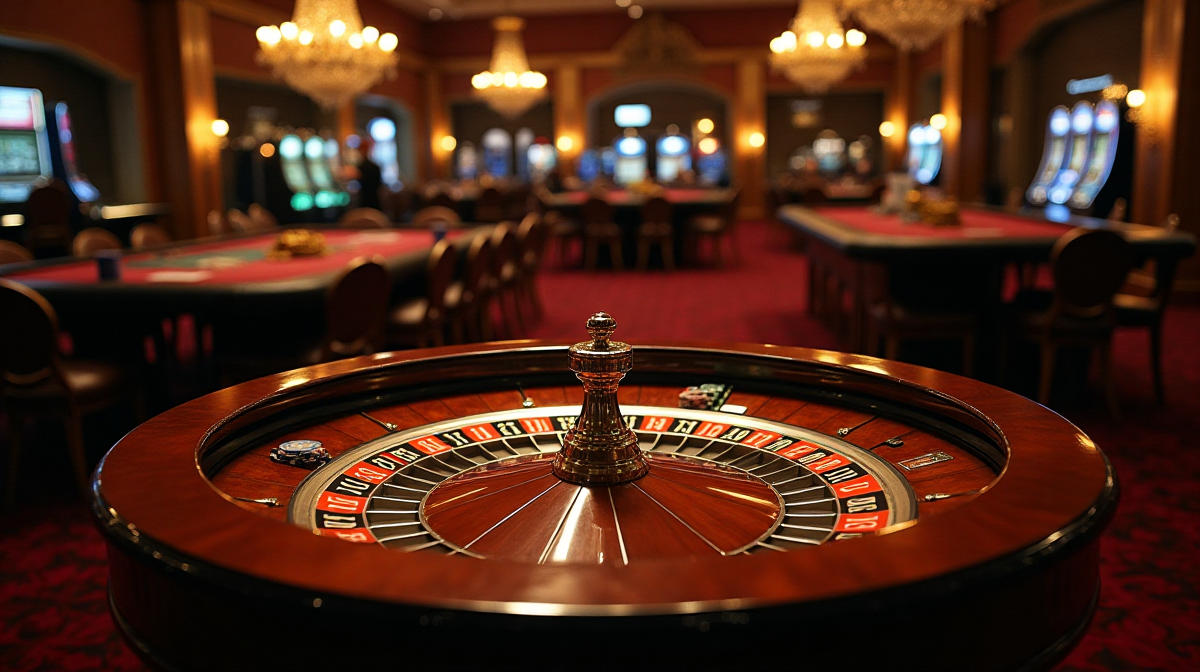No Way Out Roulette: Risk It All?
The human experience is often marked by choices, but some choices lead us down paths with no easy return – a perilous game of “no way out roulette.” This article delves into the psychology, risks, and strategies surrounding these high-stakes scenarios, offering insights into how to avoid and navigate situations where the consequences are potentially devastating. Understanding the allure and danger of feeling cornered is crucial for making sound decisions and protecting your wellbeing. Many seek quick solutions, and platforms like those offering a star bet app download promise easy wins, but often contribute to these very scenarios.
Defining No Way Out Roulette - What Does It Mean?
“No way out roulette” describes a situation where an individual finds themselves trapped by a series of escalating commitments, often stemming from initial decisions made with incomplete information or flawed reasoning. Like the game of russian roulette meaning, it involves a growing sense of desperation and a feeling that any attempt to retreat will result in catastrophic consequences. It's a gamble where the stakes continually rise, and the possibility of a favorable outcome diminishes with each spin.
Why People are Drawn to High-Stakes Decisions
The appeal of high-stakes decisions is multifaceted. For some, it's the thrill of the risk, the adrenaline rush of potentially achieving a significant reward. Others are driven by a desire for quick solutions to complex problems, believing a bold move is the only way to turn things around. The promise of a substantial payout, as often advertised through services like star bet prediction, can be particularly tempting, blinding individuals to the inherent dangers.
The Psychological Impact of Feeling Trapped – Fear vs. Opportunity
When faced with a “no way out” scenario, individuals experience a complex interplay of emotions. Fear, anxiety, and desperation are common, often leading to irrational decision-making. However, some individuals perceive the situation as an opportunity – a chance to demonstrate resilience, prove their capabilities, or achieve an extraordinary outcome. This perceived opportunity, however, can be a dangerous illusion, masking the very real risks involved.
Financial Risks - Potential Losses & Severe Consequences
The most immediate and tangible risk in a “no way out” situation is financial ruin. Escalating commitments, poor investments, or desperate attempts to recoup losses can lead to devastating financial consequences, including bankruptcy, debt, and loss of assets. Consider the allure of a “star bet” promising high returns; the reality is often significant loss, particularly when chasing initial failures.

Relationship Risks - Impact on Trust & Long-Term Stability
“No way out” scenarios often extend beyond finances, impacting personal relationships. Secrecy, deception, or reckless behavior can erode trust, leading to conflict, separation, and even the breakdown of long-term partnerships. The stress and emotional turmoil can strain even the strongest bonds.
Career & Professional Risks – Reputation and Future Prospects
Taking desperate measures to salvage a failing career or business can damage one’s reputation and jeopardize future opportunities. Compromising ethical standards or engaging in questionable practices can have lasting consequences, making it difficult to regain trust and credibility.
Emotional & Mental Health Risks – Stress, Anxiety, & Depression
The constant pressure and uncertainty associated with a “no way out” situation can take a severe toll on emotional and mental health. Chronic stress, anxiety, and depression are common, and in extreme cases, can lead to suicidal thoughts or behaviors.
Escalation of Commitment - The Sunk Cost Fallacy Explained
The escalation of commitment, often fueled by the sunk cost fallacy, is a key driver of “no way out” scenarios. This cognitive bias leads individuals to continue investing in a failing course of action simply because they have already invested significant time, money, or effort. The logic is flawed – past investments should not dictate future decisions.
Poor Initial Planning & Risk Assessment
Many “no way out” situations arise from inadequate initial planning and a failure to properly assess the potential risks. Rushing into decisions without considering the potential downsides or developing contingency plans is a recipe for disaster.
Emotional Decision-Making – Acting Impulsively
Allowing emotions to dictate decisions, rather than relying on rational analysis, significantly increases the likelihood of getting trapped in a “no way out” scenario. Impulsive actions, driven by fear or desperation, often lead to unintended consequences.
External Pressures - Influence of Others & Societal Expectations
External pressures, such as the influence of others or societal expectations, can also contribute to poor decision-making. Conforming to groupthink or succumbing to peer pressure can lead individuals to take risks they would not otherwise consider.
Business Failures & Desperate Measures
The collapses of Enron and the Madoff investment scandal serve as stark reminders of the dangers of “no way out” roulette. In both cases, executives engaged in increasingly desperate measures to conceal losses and maintain the illusion of success, ultimately leading to catastrophic consequences for investors and employees.
Personal Finance Disasters
Gambling addiction is a classic example of a “no way out” scenario. Chasing losses can quickly spiral out of control, leading to debt, financial ruin, and broken relationships. Predatory loans, with their exorbitant interest rates and hidden fees, can also trap individuals in a cycle of debt. The promise of a quick win, like with a star bet app download, often fuels these destructive cycles.
Relationship Dynamics – Toxic Cycles & Manipulation
Toxic relationships characterized by manipulation, control, and abuse can create a “no way out” scenario for the victim. Emotional dependence, fear of retaliation, and social isolation can make it difficult to escape the cycle of abuse.
Career Path Mishaps
Accepting a job with red flags – such as a high turnover rate, unethical practices, or a toxic work environment – can lead to a “no way out” situation. Individuals may feel trapped by financial obligations or the fear of damaging their career prospects.
Risk Assessment Frameworks – Quantifying Potential Outcomes
Employing risk assessment frameworks, such as SWOT analysis or cost-benefit analysis, can help to quantify potential outcomes and identify potential pitfalls before making a decision.
Seeking Independent Advice - The Value of Outside Perspectives
Seeking advice from trusted mentors, advisors, or professionals can provide valuable insights and help to avoid emotional biases. An objective perspective can often identify risks that you may have overlooked.
Developing Contingency Plans – Plan B & Beyond
Developing contingency plans – “Plan B” and beyond – is crucial for mitigating risk. Having alternative options in place can provide a safety net and prevent you from getting trapped in a “no way out” situation.
Knowing Your Limits – When to Cut Your Losses
Recognizing your limits and knowing when to cut your losses is a sign of strength, not weakness. Accepting that a particular course of action is not working and moving on is often the most prudent decision.
Building Mental Fortitude – Coping with Setbacks
Developing mental fortitude – the ability to bounce back from setbacks – is essential for navigating life’s challenges. Practicing mindfulness, gratitude, and self-compassion can help to build resilience.
Emotional Regulation – Maintaining Calm Under Pressure
Learning to regulate your emotions – to remain calm under pressure – is crucial for making rational decisions. Techniques such as deep breathing, meditation, and exercise can help to manage stress and anxiety.
Importance of Self-Awareness: Identifying Your Risk Tolerance
Understanding your own risk tolerance is essential for making informed decisions. Knowing what you are comfortable with – and what you are not – can help you to avoid taking on unnecessary risks.
Seeking Support – The Power of Community & Professional Help
Seeking support from friends, family, or professional therapists can provide a much-needed outlet for stress and anxiety. Sharing your struggles with others can help to gain perspective and develop coping strategies.
Diligent Due Diligence – Research & Validation
Thorough research and validation are essential before making any significant decision. Don’t rely on assumptions or hearsay – gather the facts and verify the information. Beware of promises that seem too good to be true, such as those often associated with quick-win schemes like a star bet prediction.
Prioritizing Long-Term Goals over Short-Term Gains
Focusing on long-term goals, rather than short-term gains, can help to avoid impulsive decisions. Consider the potential consequences of your actions and how they will impact your future.
Developing a Strong Moral Compass & Ethical Framework
A strong moral compass and ethical framework provide guidance in difficult situations. Adhering to your values can help you to make decisions that you can be proud of.
Cultivating a Culture of Open Communication & Honest Feedback
Open communication and honest feedback are essential for building trust and avoiding misunderstandings. Creating a safe space for others to share their concerns can help to prevent problems from escalating.

Reframing Risk – Opportunity vs. Catastrophe
Reframing “risk” as an opportunity for growth and learning, rather than a potential catastrophe, can help to reduce anxiety and promote resilience.
The Importance of Calculated Risks vs. Reckless Abandon
Distinguishing between calculated risks – those that are carefully considered and planned – and reckless abandon is crucial. Calculated risks can lead to positive outcomes, while reckless abandon often leads to disaster.
Final Thoughts: Prioritizing Wellbeing & Sustainable Success.
Ultimately, avoiding the “no way out roulette” requires prioritizing your wellbeing and pursuing sustainable success. This means making informed decisions, managing risks effectively, and building a life based on strong values and ethical principles. Don't fall for the allure of shortcuts or easy wins, like those promised by platforms offering a star bet – focus on building a solid foundation for a secure and fulfilling future.

